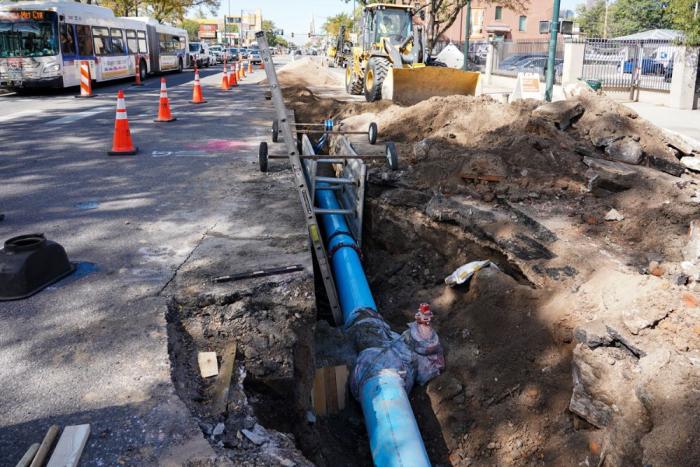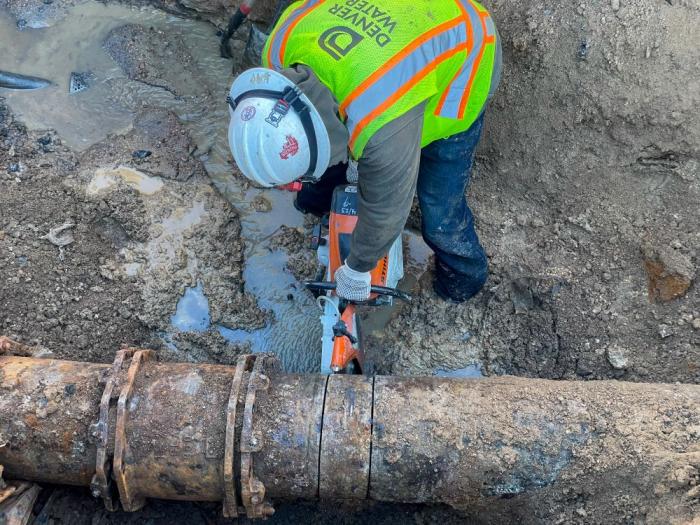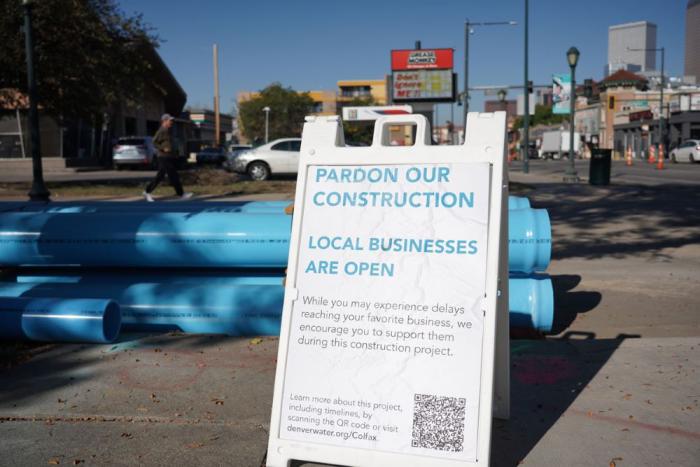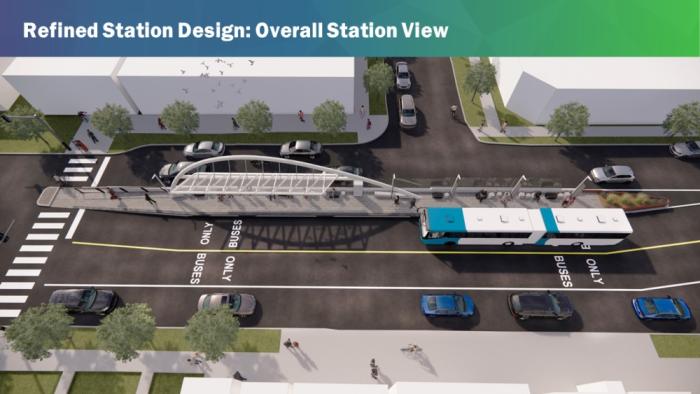Digging up the past before new buses start rolling
Editor’s note: Denver Water crews expect to wrap up the replacement of 5 miles of old, cast iron water pipes under Colfax Avenue in early 2025.
One of Denver’s most historic — and busiest — streets is getting ready for the future, and Denver Water is digging in to do its part.
The future is the new East Colfax Avenue Bus Rapid Transit system scheduled to open in 2027.
It’s a collaborative project between the City and County of Denver, the Regional Transportation District and the Colorado Department of Transportation that reimagines how people will be transported along the busy stretch of Colfax Avenue from Broadway east to Yosemite Street, where Denver ends and Aurora begins.
The project will create two center lanes for buses between Broadway and Yosemite Streets. The goal is to use the bus-only lanes to move people more efficiently, safely and sustainably through the corridor.
Denver Water is not part of the transit project, but wanted to proactively replace more than 5 miles of underground cast iron water pipes before the new bus lines are built.
Denver Water’s construction work on Colfax is part of the utility’s proactive pipe replacement program, which aims to replace about 80,000 feet of water distribution pipes annually.
“This stretch of pipeline dates back to the late 1800s, and while it’s held up amazingly well for more than 130 years, we’ve had it on our radar for replacement for a while. We’ll replace the pipe and upgrade to a more reliable system,” said Katie Ross, engineering project manager for Denver Water.
“When we learned about the bus rapid transit project, we decided to accelerate our timeline to replace the pipeline now, so we don’t have to dig up the street in the future and make repairs when the new bus lanes are in place.”
Water upgrades in a fast-growing city
Denver Water has some of the oldest infrastructure in the metro area, as much of its network of pipes was installed in the late 1800s and early 1900s. As new projects are built in its service area, Denver Water will coordinate with partner agencies if the utility decides it needs to proactively upgrade its pipeline network in the area of the new project.
“We work with cities, counties, developers and CDOT to make sure we’re aware of upcoming projects next to our infrastructure, so we’re not digging up a street that was just worked on,” Ross said.
“With the Colfax pipe replacement project, this is an example of how we put our water rates to work and be good partners at the same time.”
Working with businesses and managing traffic
Major construction projects such as the Colfax pipe replacement project often affect surrounding businesses and traffic.
Denver Water has been working with Denver’s Department of Transportation and Infrastructure, RTD, CDOT and local business leaders to make sure the construction work goes as smoothly as possible.
“We’ve been talking with all the business owners about the project so that when construction impacts them, they can be prepared,” said Ariana Saldivar, a community relations specialist at Denver Water.
“We want the community to know businesses are open during the project, and we ask for patience as our crews complete these upgrades.”
As customers are connected to the new pipeline, which requires the water service to be turned off as the new connection is put in place, Denver Water has worked to limit the amount of time customers are without water to just a few hours and do the work at a time when there is the least impact on the business.
As for traffic, Denver Water’s work zones typically affect two blocks of Colfax at a time.
The work, which takes about one to two weeks per block, involves site preparation, installing and connecting customers to the new pipe, ensuring the new pipe is ready to carry water to customers, and repaving the street. Two-way traffic is also maintained, with one lane open in each direction through construction zones.
“We understand that construction work is an inconvenience. That’s why we work hard to minimize the impact on the community,” Saldivar said.
“Communication is key for us. We alert residents, businesses, RTD and partnering agencies before, during and after the work is done so they’re aware of what’s happening. Construction work can also have unexpected delays, so we do our best to get the word out when things change.”
Project timeline
Denver Water began work on the Colfax pipeline replacement project in June 2023, starting at the intersection of Colfax and Broadway next to the Colorado Capitol. Crews have been working their way east. In September 2023, a second Denver Water crew started work on the east side of the project, at Yosemite Street and Colfax, the border between Denver and Aurora.
Denver Water expects to complete its pipe replacement work by the end of 2024.
Construction work on the bus rapid transit system, or BRT, is currently expected to begin in fall 2024 and buses are expected to be up and running in 2027.
“The city’s partnership with Denver Water on the pipe replacement project ahead of the BRT project exemplifies a shared vision in which infrastructure upgrades become a collective effort to reduce disruptions and provide much needed improvements to the community,” said Brian McLaren, Denver’s BRT project manager.
You can check denverwater.org/Construction for updates on the pipe replacement project on Colfax as well as other Denver Water projects.





